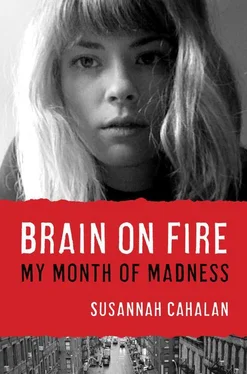The term schizoaffective disorder was introduced in 1933 in a much-quoted paper, “The Schizoaffective Psychoses”: “Like a bolt from the blue, full-blown delusions suddenly shatter the poise of a fully rational mind… and flare up without premonitory signs… . 20”
A more updated description defines it as a diagnosis when mood symptoms, which are characteristic of bipolar disorder, overlap with psychosis, which is symptomatic of thought disorders like schizophrenia. The American Psychiatric Association’s Diagnostic and Statistical Manual of Mental Disorders, version IV-TR, the edition that was used during my hospital stay, defines the disorder as an “uninterrupted period of illness during which, at some time, there is either a Major Depressive Episode, a Manic Episode, or a Mixed Episode. 21” To earn such a diagnosis, a patient has to experience two or more of the following: positive symptoms, like delusions, hallucinations, and disorganized speech, and negative symptoms, such as mutism or general apathy.
EEG video, March 24, 11:06 p.m., 11 minutes
“Patient push button in room 1279. Patient push button in room 1279,” the prerecorded voice says. My hospital gown peeks through from the covers that are pulled up to my neck, and I hold a cell phone to my ear, talking animatedly into its mouthpiece. It is unclear if anyone is on the other end. I pick up the hospital-provided TV remote and speak into it. There is certainly no one at the other end of that conversation. I point to the camera accusingly, gesticulating wildly, and put my hands to my head in frustration.
“Oh my god,” I cry and hit the nurses’ call button.
“Can I help you?” a nurse says over the intercom.
“No, no, it’s okay.”
“Ma’am? Lady? Miss? I’m coming,” another nurse chimes in.
I’m mumbling to myself now. “I don’t know what’s happening. I’m going to turn my phone off.” I toss my cell phone to the foot of the bed. A nurse arrives with some pills, and I swallow them without hesitation, like I’m taking a shot of tequila. “I can’t have it on me. I’m on the news.”
The nurse answers, but too softly for the video to pick it up.
I begin to shout and kick my legs, and I grab for the nurse’s call button. “Please, please, please. I’m freaking out, I’m freaking out.”
“Patient push button in room 1279. Patient push button in room 1279.”
“Please put the TV back on. PLEASE PUT THE TV BACK ON!”
Ignoring my outburst, the nurse positions the guardrails to make sure they’re firmly in place.
“Don’t you see? I’m on TV, I’m on the news,” I howl. I pick up the TV remote and speak into it again. And then place my head in my hands and rock back and forth. “Please, please, please. Oh my god, oh my god. Please get me a doctor. Please get me a doctor. Please, please, please.”
The nurse leaves. There is a flushing of toilets. I stare straight up at the ceiling as if I am praying.
End of video.
“We’ll be investigating what’s happening with news reporter Susannah Cahalan, currently at New York University,” a coiffed female anchor announces. I am top-of-the-hour news.
“I’m on the news!” I call out. Nobody answers.
“Her father was recently arrested for the murder of his wife,” the anchor says as the camera pans to my father walking handcuffed through a sea of paparazzi, bulbs flashing, and reporters with their notebooks open and ready to lunge.
I’ve been so stupid. I shouldn’t have answered calls from coworkers. They are secretly writing down what I’m saying. They know I cried in the newsroom. They’ll put that into my story. “New York Post Reporter Unravels after Father Kills Wife. ”
“I’m on the news!” I grab the emergency nurse’s call button. They have to know about the plot. They have to know not to let anyone in. “They’re all going to try to interview me,” I scream into my cell phone. Beads of sweat form on my brow. I wipe them away.
I hear the cackling of the patient to my left, a South American woman who spent all day chatting with her visitors in Spanish — or was it Portuguese? Now she’s laughing at me. Maybe she was laughing at me the whole time. I hear her fake fingernails tap her cell phone keys. She’s still speaking in Spanish, or whatever language it is, but now I can understand it.
“There’s a girl from the New York Post in the bed next to me. I’m going to record her with my cell phone and I’ll give you all the information and you can give it to the Post . Tell them it’s an exclusive from someone in the hospital.” She laughs again.
“This girl is loco, trust me. Trust me, this is good stuff, I promise. We can make a lot of money with this scoop. Ca-ha-ha. Call all the local stations. I’ll tell them everything. Just make sure we get some money out of it. Ca-ha-ha.”
PSSSSTTTTT
What the hell was that?
PSSSSSTTTT
I hear it again.
PSSSTTTT over here.
I turn my head to the left. The South American woman has stopped her maniacal texting and has moved the curtain with her hand so that I can see her face.
“The nurses here are bad news,” she says softly.
“What?” I ask, not sure if I heard her correctly or if she spoke at all.
“Shhhh, they can hear you,” she hisses, pointing to the cameras. “The nurses here aren’t right. I don’t trust any of them.”
Yes, yes, Strange Spanish Lady, that is true. But why is this undercover agent telling me this? She moves the curtains back in place, leaving me alone.
I need to leave. Now. Once again I grab the wires on my head, handful by handful, pulling them out with chunks of hair, and throw them on the floor. Instantly, I’m at the door. I’m through it. My heart pounds. I can feel it leaping up into my lungs. The security guard doesn’t notice me. I sprint to the red EXIT sign. A nurse runs up beside me. Think, think, think, Susannah. I dodge into a hallway and run, racing, racing, racing — directly into another nurse’s arms.
“Let me go home! Let me leave!”
She takes me by the shoulder. I kick her, screaming. I bite at the air. I must leave. I must go. LET ME GO. The cold floor. A purple lady grabs hold of my feet as the other nurse holds my arms down. “Please, please,” I try to say through clenched teeth. “Please let me go.”
Darkness.

Two escape attempts earned me a one-to-one guard; now, after the third attempt in as many days, one nurse casually suggested to my father that if I kept dislocating the wires and trying to escape, I wouldn’t be allowed to stay. “If she doesn’t stop with that behavior, she’ll be moved to a place that won’t have this level of care. And she won’t like the place as much, I can promise you that,” she told him. My dad heard the threat loud and clear: if I continued along this path, I would be sent to a psychiatric ward. He decided that whatever happened, he would be by my side. He and I hadn’t spent much time together since the divorce, and he was making up for it now. Having just left his banking job, he had the freedom and flexibility to spend his days with me. And he wanted the staff to know someone was looking out for me. He knew people often saw him as intimidating—despite his average height and build, my babysitter Sybil had always called him “big man”—and he was determined to capitalize on this if it would help me. Since I wouldn’t let him in the room, still convinced he’d murdered Giselle, he decided to hold his vigil out in the hall and read a book.
Читать дальше














